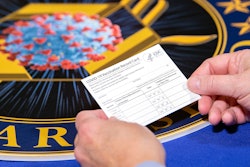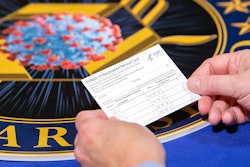Trucking news and briefs for Friday, Feb. 25, 2022:
FMCSA clarifies ‘medical treatment’ in relation to carriers’ accident registers
The Federal Motor Carrier Safety Administration is updating its guidance, effective Friday, Feb. 25, to reflect that an x-ray exam is a diagnostic procedure and should no longer be considered a “medical treatment” in determining whether a crash should be included in a motor carrier’s accident register.
Current FMCSA guidance – which the agency notes lacks the force and effect of law and is just intended to clarify existing regulations – considers an x-ray exam and other imaging as medical treatment.
Federal regulations require that motor carriers keep an accident register for three years after the date of an “accident,” which FMCSA defines as an occurrence involving a commercial vehicle operating in interstate or intrastate commerce that results in a fatality; bodily injury to a person who, as a result of the accident, receives medical treatment away from the scene of the accident; or one or more motor vehicles being towed from the scene.
FMCSA says it received a petition requesting a revision to Question 27 of its guidance related to 49 CFR Part 390, stating that an x-ray is a diagnostic test that may find no injury and should not be considered a form of medical treatment. The petitioner suggested that FMCSA mirror the Occupational Safety and Health Administration’s definition of medical treatment that excludes diagnostic procedures, such as x-rays and blood tests. FMCSA says it agrees with the revision.
The new guidance regarding x-rays and accident registers will read as follows:
Question 27: A person is transported to a hospital from the scene of a commercial motor vehicle traffic accident. In one situation, the person undergoes observation or a checkup. Is this considered “medical treatment,” making the CMV occurrence an “accident” for purposes of the Federal Motor Carrier Safety Regulations? In another situation, the person undergoes x-ray examination or is given a prescription but is released from the facility without being admitted as an inpatient. Is the x-ray or prescription considered “medical treatment,” making the CMV occurrence an “accident” for purposes of the FMCSRs?
Guidance: In the first situation, no. A person who does not receive treatment for diagnosed injuries or other medical intervention directly related to the accident, has not received “medical treatment” as that term is used in 49 CFR 390.5 or 390.5T. In the second situation, a person who undergoes an x-ray examination (or other imaging, such as computed tomography or CT) has not received “medical treatment.” The x-ray examination is a diagnostic procedure but is not considered “medical treatment.” However, a person who is given prescription medication (or the prescription itself) has received “medical treatment.”
Telematics now standard on Carrier reefers
Carrier Transicold announced Thursday it is now making telematics a standard feature on its most popular trailer refrigeration units.
“Each year since its introduction, our telematics solution has been helping a rapidly increasing number of refrigerated fleets manage and monitor mission-critical data from their trailer assets,” says David Brondum, director of Telematics, Carrier Transicold. “By offering telematics as standard for our X4 series and Vector 8000 series trailer and rail refrigeration units, it is easier than ever for customers in the United States and Canada to benefit from the considerable advantages provided by the industry’s premier IoT solution.”
According to Carrier, the web-based interface of the telematics provide continuous visibility of cold chain assets via a centralized data stream that shows trailer temperatures, location and movement.
The platform can also enable remote control of refrigeration unit settings. Connected fleets can improve operations by optimizing refrigeration equipment usage, achieving greater efficiency and helping to manage refrigeration unit maintenance, the company says.
Depending on configuration and service plan, Carrier says customer benefits include:
- Trailer temperature monitoring and control for compliance and accountability.
- Automatic notifications as trailers arrive and depart from geofenced areas.
- Real-time alerts if a warning condition occurs on a unit in service.
- Refrigeration unit performance monitoring for fuel efficiency and product protection.
- Labor-saving wireless data transfer for remote setpoint management, pre-trip diagnostic routines, hands-free trailer precooling and more.
- Fuel level monitoring, helping to avoid low-fuel incidents requiring emergency callout service.
- Door switch monitoring to track deliveries and identify potential theft situations.
- Improved refrigeration unit uptime made possible by continuous analytic and diagnostic information about refrigeration units.
For fleets to take advantage of their built-in telematics systems, commissioning by an authorized Carrier Transicold dealer is required along with selection of a data plan. Carrier says three plans are available: Monitor; Two-way Monitor and Control; and Monitor and Enhanced Control, adding exclusive capabilities for data downloads, remote software updates and adjustments to Carrier Transicold IntelliSet control configurations.
Carrier adds standard hardware includes the 4G LTE communications module, antenna and wiring harness. Optional peripheral components such as fuel sensors, temperature probes, door switches and solar panels can be specified as needed. Customers who take advantage of Carrier Transicold’s telematics system will benefit from value-added data insights that come from future releases of the company’s Lynx Fleet application.










